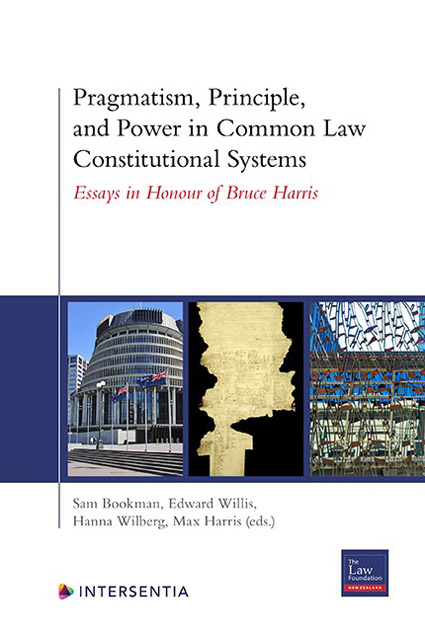 Pragmatism, Principle, and Power in Common Law Constitutional Systems
Pragmatism, Principle, and Power in Common Law Constitutional Systems Book contents
- Frontmatter
- Foreword
- Preface
- Contents
- The Writings of Professor Bruce Harris
- List of Cases
- List of Contributors
- Introduction
- Part I The Nature of Executive Power
- Part II Issues Concerning The Judiciary: The Nature of Judicial (and Executive) Power
- Part III Issues Concerning The Judiciary: Creativity and Pragmatism in Judicial Method
- Part IV Issues Concerning The Judiciary: Judicial Appointment and Accountability
- Part III The Nature of Unwritten Constitutions and Their Future
- Index
Declarations of Inconsistency and Judicial Creativity: A Tale of Two Taylors
Published online by Cambridge University Press: 19 November 2022
- Frontmatter
- Foreword
- Preface
- Contents
- The Writings of Professor Bruce Harris
- List of Cases
- List of Contributors
- Introduction
- Part I The Nature of Executive Power
- Part II Issues Concerning The Judiciary: The Nature of Judicial (and Executive) Power
- Part III Issues Concerning The Judiciary: Creativity and Pragmatism in Judicial Method
- Part IV Issues Concerning The Judiciary: Judicial Appointment and Accountability
- Part III The Nature of Unwritten Constitutions and Their Future
- Index
Summary
INTRODUCTION
As a law student who started at Auckland in the late 1990s, I received my education in public law from true titans in the field: Bruce Harris, Paul Rishworth, Mike Taggart and later Janet McLean. I would like to think that I had some sense of how lucky I was to be taught by such eminent scholars, but I suspect this would be revisionist history. As a student, one tends to have at most a superficial sense of an academic's scholarship (or even that academics do scholarship). In any case, any appreciation of an academic's scholarly reputation was secondary to what they were like as a classroom teacher. Some years later, I came to have the great privilege of having Bruce, Paul, Mike and Janet as colleagues. It was really only at this juncture, as a young academic starting out in the field of public law, that the full extent of the legacy I was continuing dawned upon me. At this point too, it became much clearer to me that what I had seen in the classroom as a student was just one small slice of the whole.
Universities like to talk about research-informed teaching – a synergy between one's research and teaching. For some it represents an unattainable holy grail. I do not think it was for Bruce. He taught public law at part II and honours level for many years; his scholarship covered a broad swathe of public law, as reflected by the range of contributions to this collection. While he is perhaps best known for his account of the ‘third source’ of executive power, another focus of his scholarship was the institution of the judiciary, as exemplified by his work on remedies for judicial error and judicial accountability, and his argument for a judicial commission to handle appointments, discipline and education.
Bruce's interest in the judiciary extended to matters of adjudication. In 2007, he published a chapter entitled ‘Judicial Activism and New Zealand's Appellate Courts’ for a collection edited by Brice Dickson of Queen's University Belfast. Despite the title of the chapter, Bruce largely eschewed the label of judicial activism on account of its pejorative connotations, preferring instead the term judicial creativity.
- Type
- Chapter
- Information
- Pragmatism, Principle, and Power in Common Law Constitutional SystemsEssays in Honour of Bruce Harris, pp. 81 - 108Publisher: IntersentiaPrint publication year: 2022


